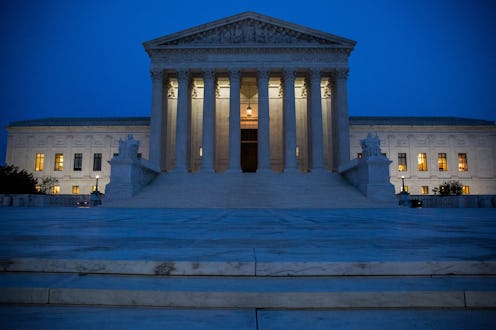News
This Upcoming Supreme Court Case Will Determine If…

If you haven't heard of Portland, Oregon, dance-rock band The Slants yet, you'll probably be seeing more and more of them in the coming months. But their rise to fame isn't for their music, but rather for their name. The group's moniker is at the center of an upcoming Supreme Court case that could determine if marginalized groups can reclaim and commercialize names considered offensive.
Set to be argued on Jan. 18, Lee v. Tam centers on the question of whether or not the band, whose four members are all Asian American, can trademark the name "The Slants," which contains a historical racial slur against people of Asian descent. The band says they have reclaimed and taken ownership of the originally disparaging word. When they tried to trademark their name, however, the U.S. Patent and Trademark Office denied their request under the Trademark Act of 1946, which declines registration of names that "consists of...matter which may disparage...persons, living or dead...or bring them into contempt, or disrepute." While the denial doesn't prevent them from using the name, it does prevent them from keeping others from adopting and profiting off of it.
Extending beyond the subject of trademark law, the case has become a First Amendment rights battle with implications for many more people and groups than just the band members themselves. Depending on what the Supreme Court decides, a victory for The Slants could mean a victory for groups of marginalized people looking to reclaim offensive language across the country. However, it could also have unintended benefits for companies that have offensive names rooted in racism rather than empowerment.
Speaking to The Oregonian earlier this year, the band's founder Simon Tam expressed exasperation at the Washington Redskins' interest in the case to review and potentially reverse their own trademark cancellation from 1992. But as Tam's lawyers pointed out, The Slants' name bears more resemblance to N.W.A. in "appropriating a slur and using it as a badge of pride," as opposed to the Washington Redskins, whose name was chosen by white American businessman — and infamous racist — George Preston Marshall.
Lee v. Tam comes at a time when conversations around racial language and reclamation of offensive terms is at the forefront of American discourse. President-elect Donald Trump took the time to bash "political correctness" several times during his campaign, all while making disparaging comments about many different groups, including Mexicans, African Americans, Muslims, and women. At the same time, the past couple years have seen much thoughtful conversation and debate over reclamation of the word "queer" as it has become more and more of a mainstream term for LGBT communities.
Undoubtedly, language holds power, as Tam wrote for the similarly situated Bitch Media last year.
The act of claiming an identity can be transformational. It can provide healing and empowerment. It can weld solidarity within a community. And, perhaps most importantly, it can diminish power from an oppressor, a dominant group.
But with such power in the hands of government institutions, places like the U.S. Patent and Trademark Office need to treat their responsibilities with more nuance and regard to the U.S.'s history of white supremacy and oppression of minority groups than we've expected of them in the past. The Slants' winning this Supreme Court case could either be a landmark moment in how race is spoken about in this country, or an opening of the floodgates for groups and companies with insensitive and harmful intent.
Lee v. Tam is a SCOTUS case you will want to keep on your radar in the coming weeks, and one whose outcome will have consequences far beyond the realm of dance rock in the Pacific Northwest.